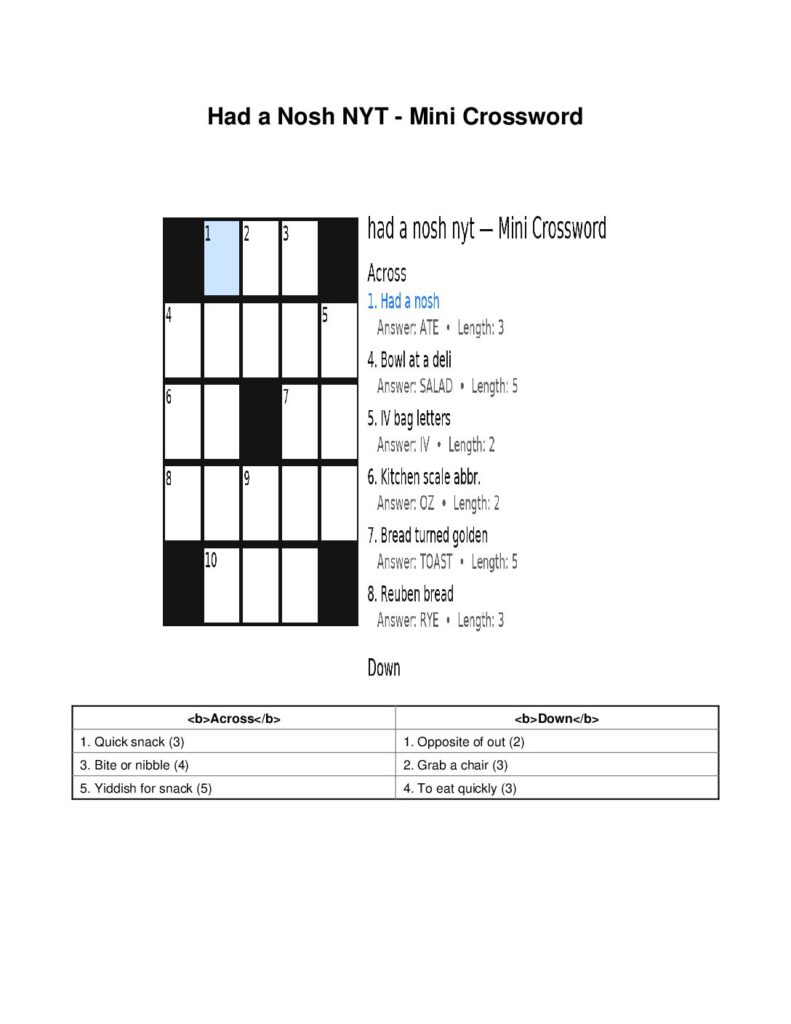By The Wandering Spoon | Published: August 20, 2025
Crosswords are kitchens of the mind. Each square is an ingredient, each clue a recipe. And sometimes, they feed us words as warm as soup: “had a nosh nyt.”
To nosh is more than eating—it’s savoring, nibbling, tasting life in little bites. In the crossword, it’s a clue. In life, it’s a philosophy.
What Does “Had a Nosh NYT” Mean?
Crossword Origins of the Phrase
In the New York Times Crossword, “had a nosh” often hints at ate, snacked, dined. A simple, casual bite written into grids.
The Yiddish Soul of “Nosh”
The word comes from Yiddish, whispered with affection at kitchen tables: “Come, have a nosh.” It carries warmth, care, and comfort.
Food as Language, Language as Food
How Words Nourish Like Bread
Some words, like bread, sustain us. “Nosh” is one of them—light but filling, casual yet comforting.
The Poetry of Informal Bites
Unlike grand banquets, noshing is small, tender. It’s the poetry of a bite stolen between laughter.
The Crossword Connection
Why NYT Loves Food Clues
Food is universal, and so are puzzles. Both bring people together—on paper, at tables, across cultures.
Across and Down as Recipes for Thought
Across clues stretch like breadsticks; down clues fall like crumbs. Together, they make a meal of meaning.
A Bite of History – The Word “Nosh”
Yiddish Roots and Cultural Embrace
From Yiddish nashn, “to nibble,” it spread into American English through Jewish communities, carrying warmth into everyday speech.
Nosh in American English
Today, we nosh at parties, nosh on chips, nosh between classes. It’s casual, like leaning on a friend’s shoulder.
When Eating Becomes a Clue
Common NYT Crossword Food Clues
Clues like bagel topping, lox partner, latke eater—they fill the puzzle with flavor.
How Solvers Taste Words Before Answers
When you read had a nosh, you don’t just think ate—you feel it, hear the clinking of dishes.
Emotional Eating and Solving
Comfort Food and Comfort Words
Crosswords, like food, soothe. They give the restless mind something to chew on.
The Crossword as a Meal for the Soul
Every solved clue is a bite savored, every finished puzzle a plate licked clean.
Hints, Answers, Trivia (Crossword Style)
Across
-
🥯 Had a nosh (Answer: ATE)
-
🍎 Fruit in Eden (Answer: APPLE)
Down
-
📰 NYT, for short (Answer: TIMES)
-
🍫 Sweet treat between meals (Answer: SNACK)
Difficulty Rating
⭐️⭐️⭐️ out of 5 – playful, rich with cultural flavor.
Trivia
Did you know? The NYT crossword has featured nosh over 150 times, often linked with food clues like bagel or snack.
Food as a Universal Symbol
Shared Meals as Shared Answers
When we eat together, we share more than food—we share stories. Crosswords do the same with words.
How Puzzles Bring People Together Like Dinner Tables
Solvers across the world “nosh” on clues at the same time. It’s a silent feast of minds.
Lessons From a Bite
Small Joys Matter
Never underestimate the happiness of a small nosh—or a solved clue.
Every Crumb Holds a Story
Behind every word is a culture, a family, a memory.
Tips for Solving Food-Themed Crosswords
Learn Cultural Foods
Know your bagels, lox, and latkes—crossword solvers are global diners.
Embrace Slang and Informal Terms
“Nosh” isn’t formal, but it’s flavorful. Crosswords love that.
Notice the Flavor of Context
“Had a nosh” might mean ate in one puzzle, snacked in another. Context is seasoning.
Conclusion – A Full Plate of Words and Wonder
The phrase “had a nosh nyt” isn’t just a clue—it’s an invitation. To taste language. To savor culture. To bite into the puzzle of life with joy.
Crosswords remind us: a nosh is never just a snack. It’s nourishment, laughter, and love, tucked between black-and-white squares.
FAQs
1. What does “had a nosh nyt” mean in a crossword?
It usually points to answers like ate or snacked.
2. What language does “nosh” come from?
Yiddish, from the word nashn meaning “to nibble.”
3. Why does NYT use food in clues so often?
Because food is universal, playful, and familiar to solvers everywhere.
4. Is “nosh” still common in daily speech?
Yes—especially in American English, where it means “a quick bite.”
5. How do food clues add flavor to puzzles?
They connect culture, memory, and taste—making puzzles feel alive.
